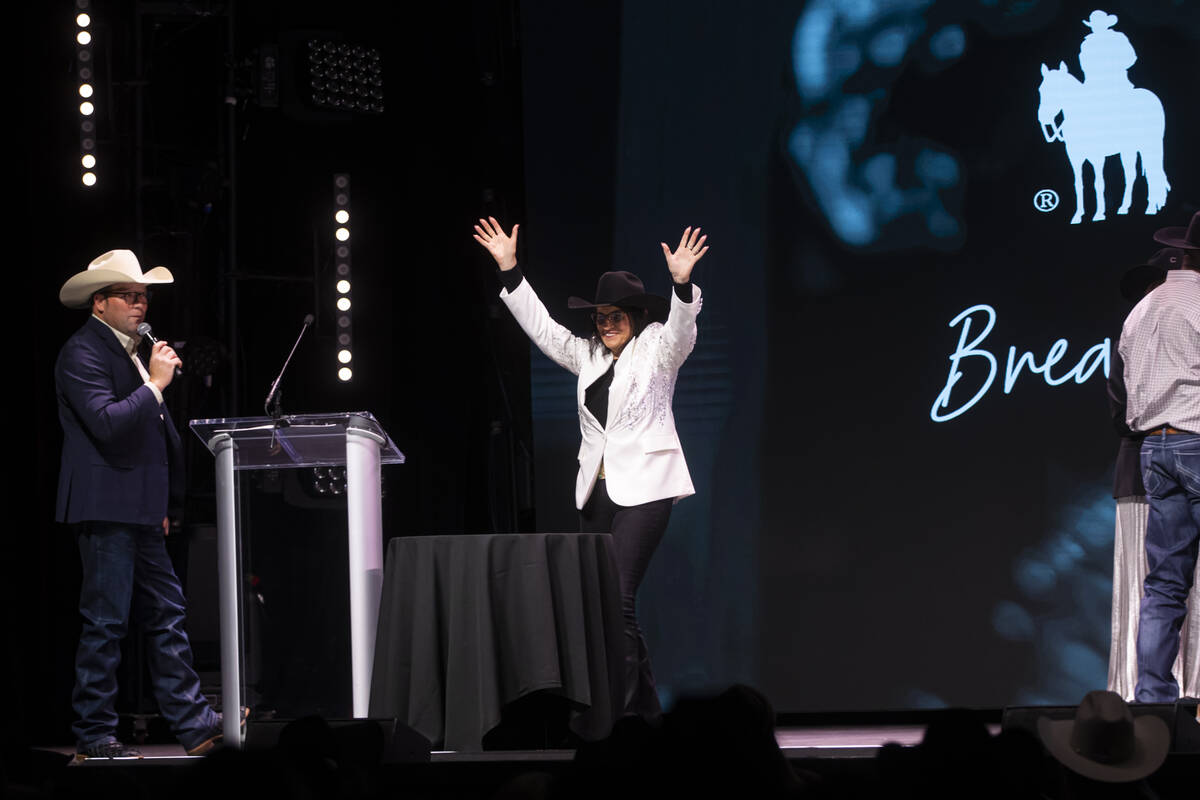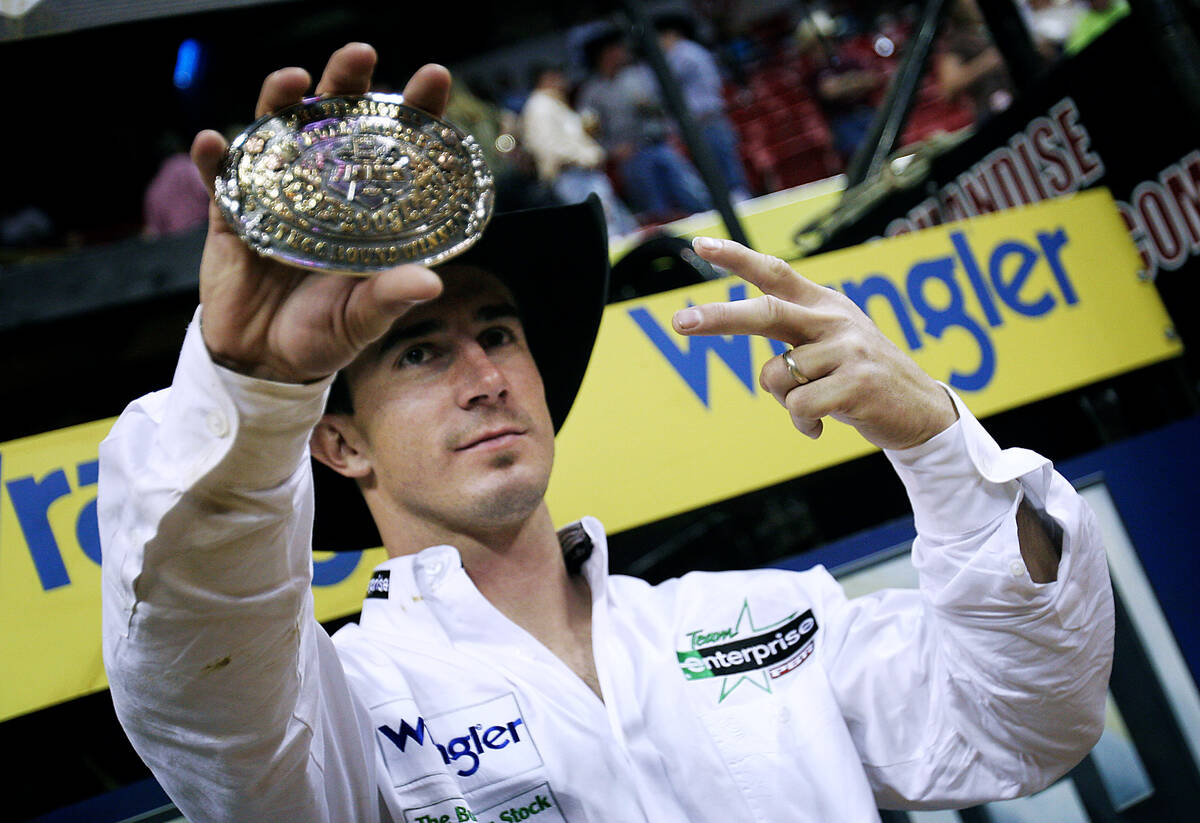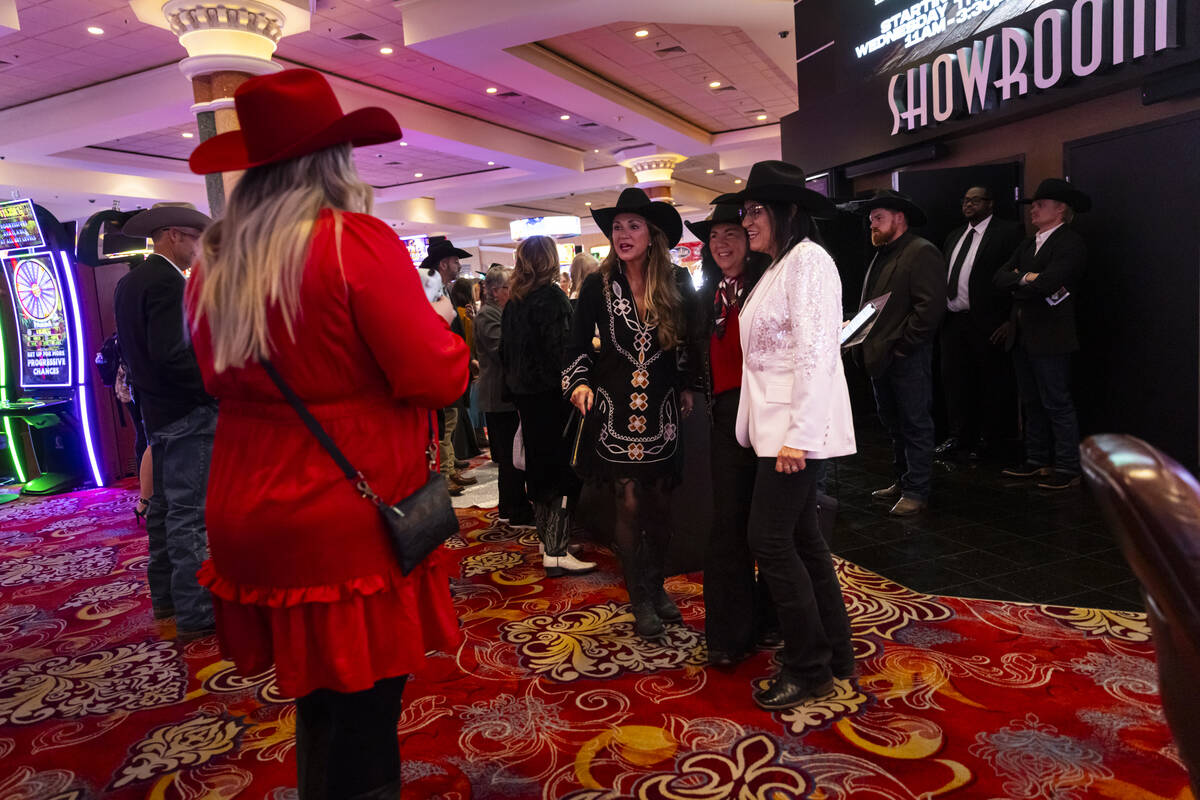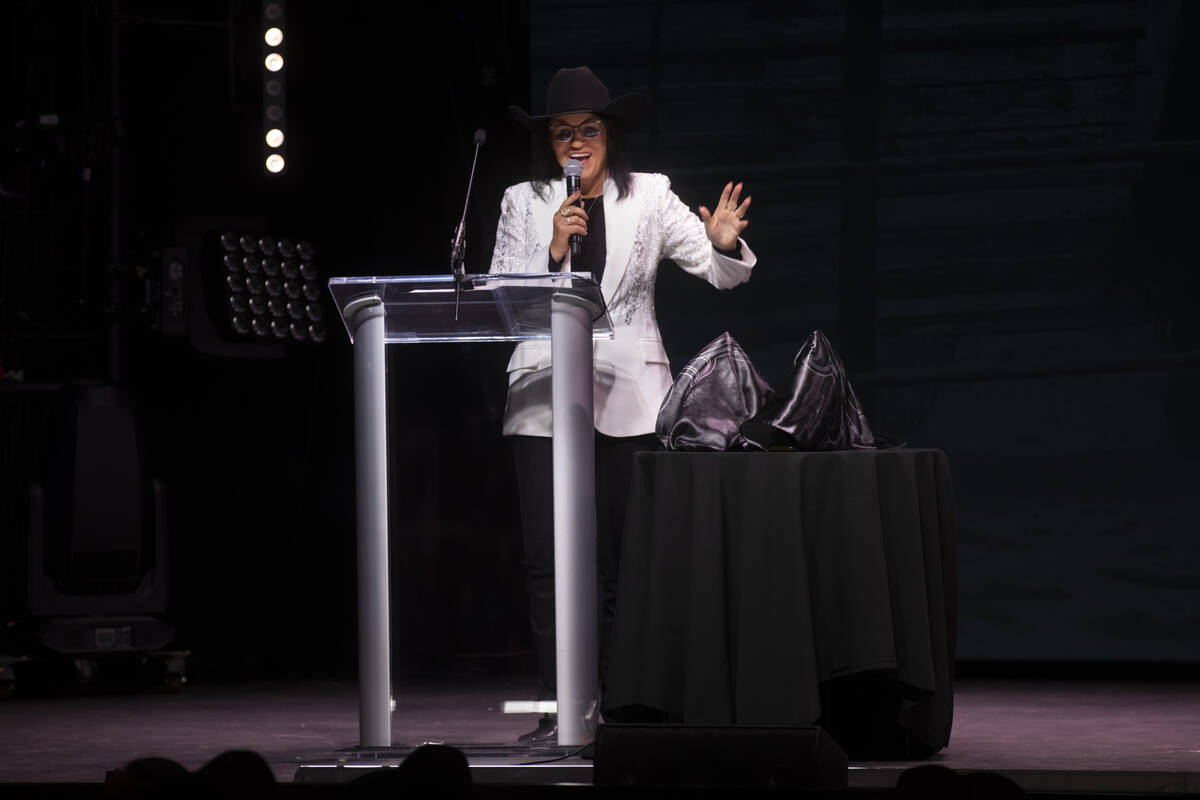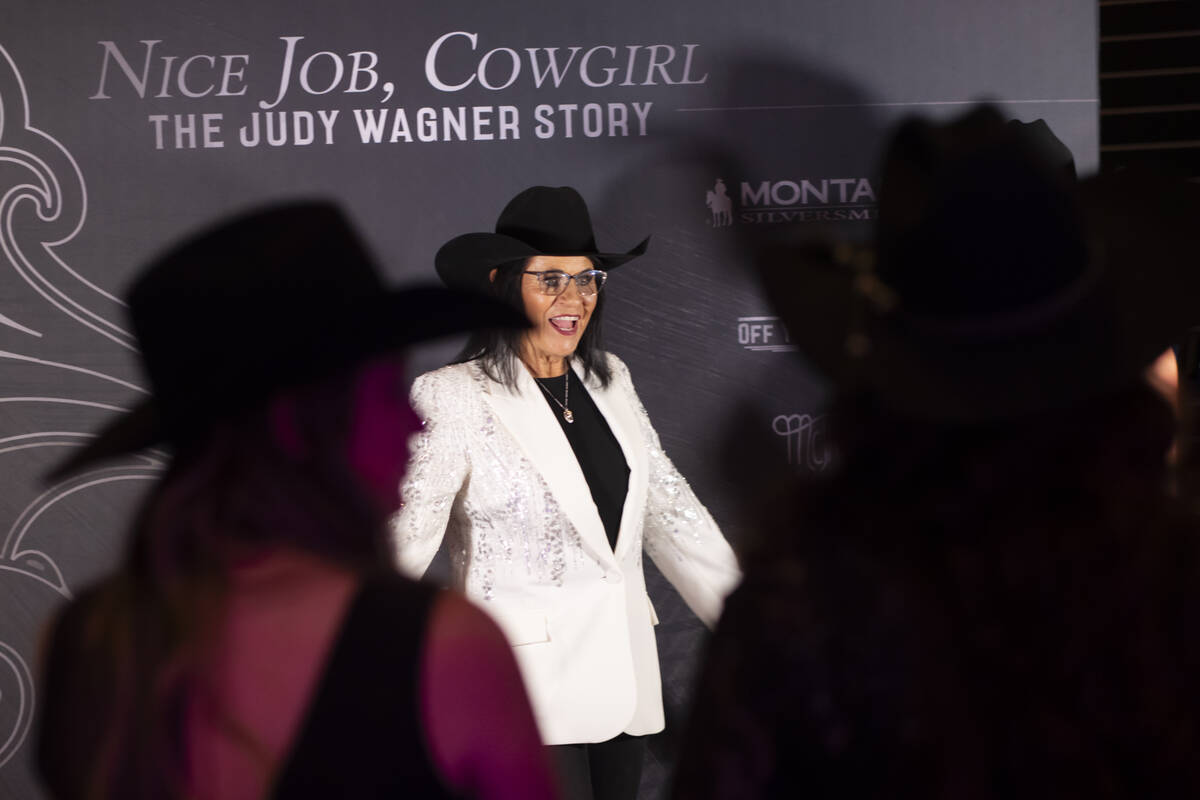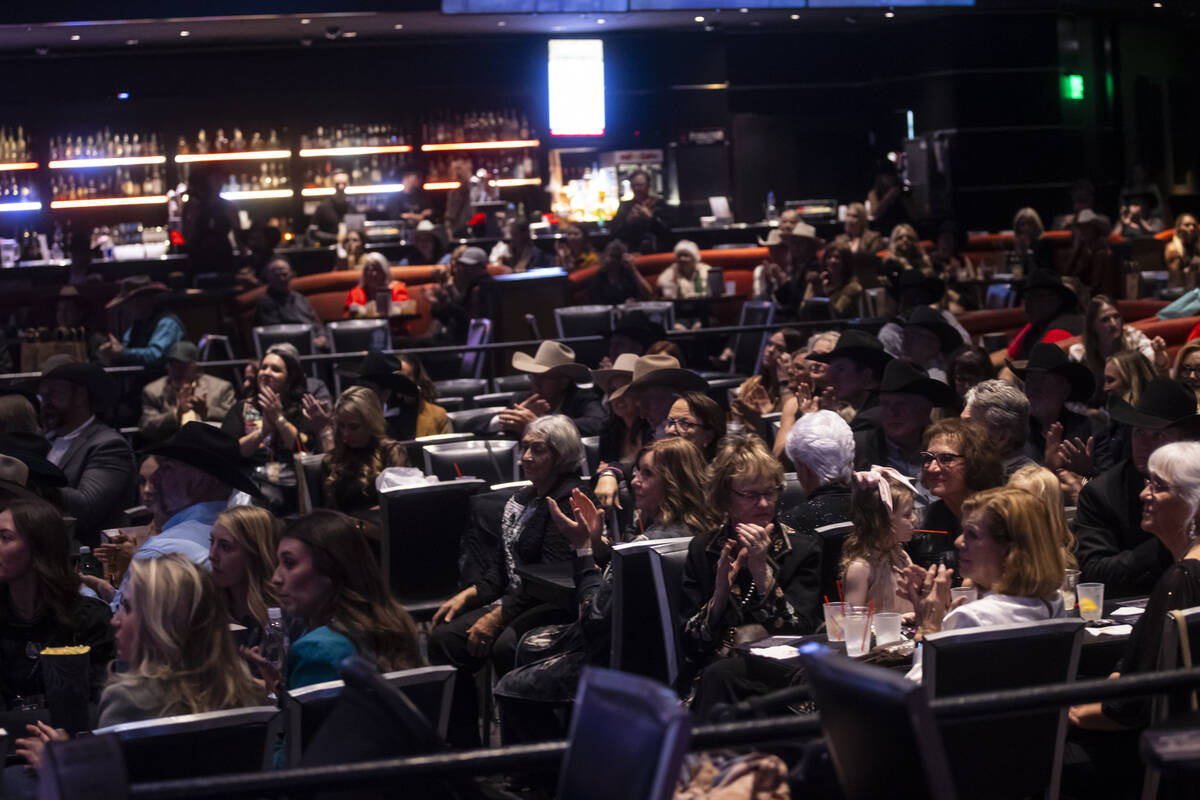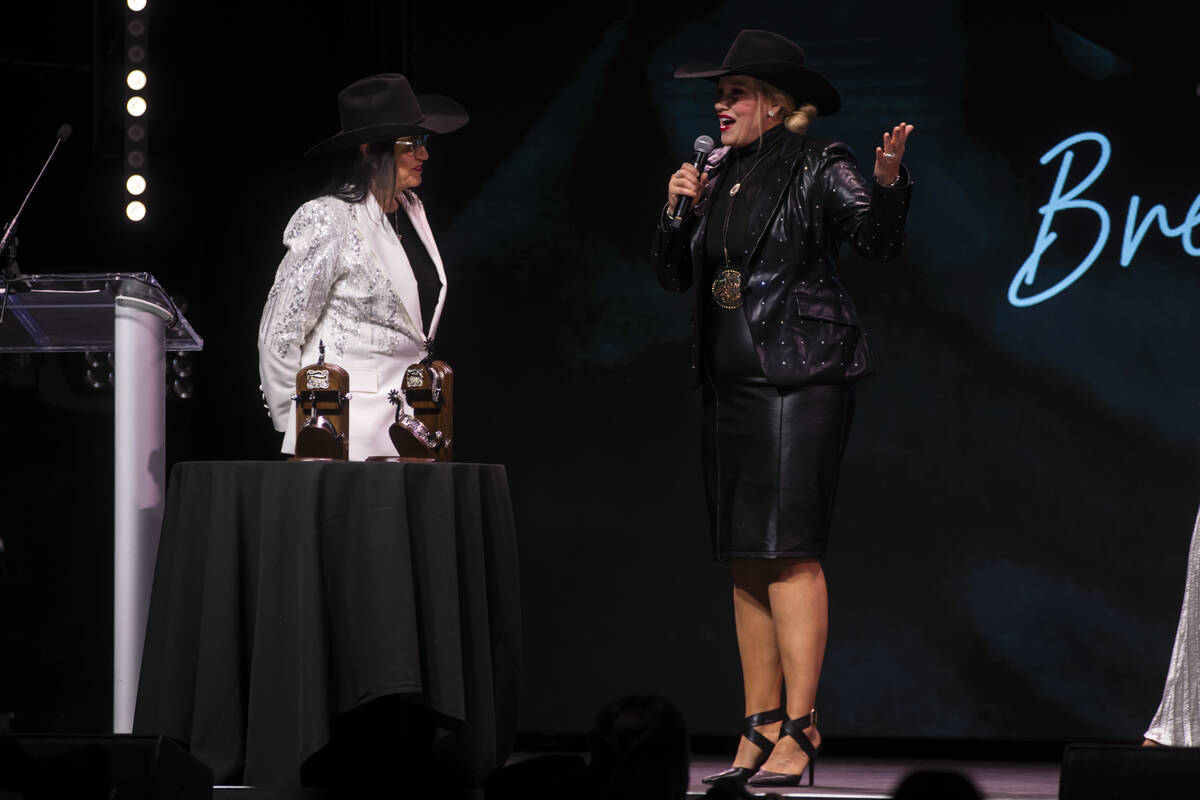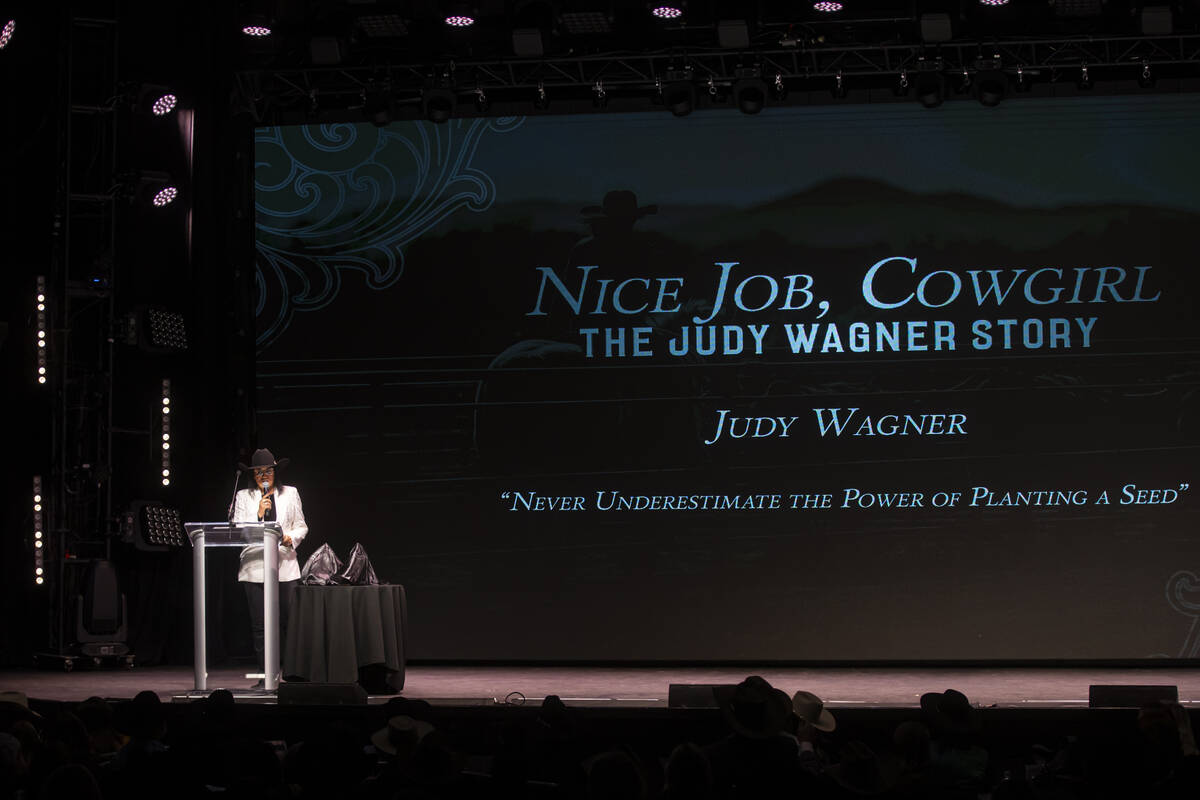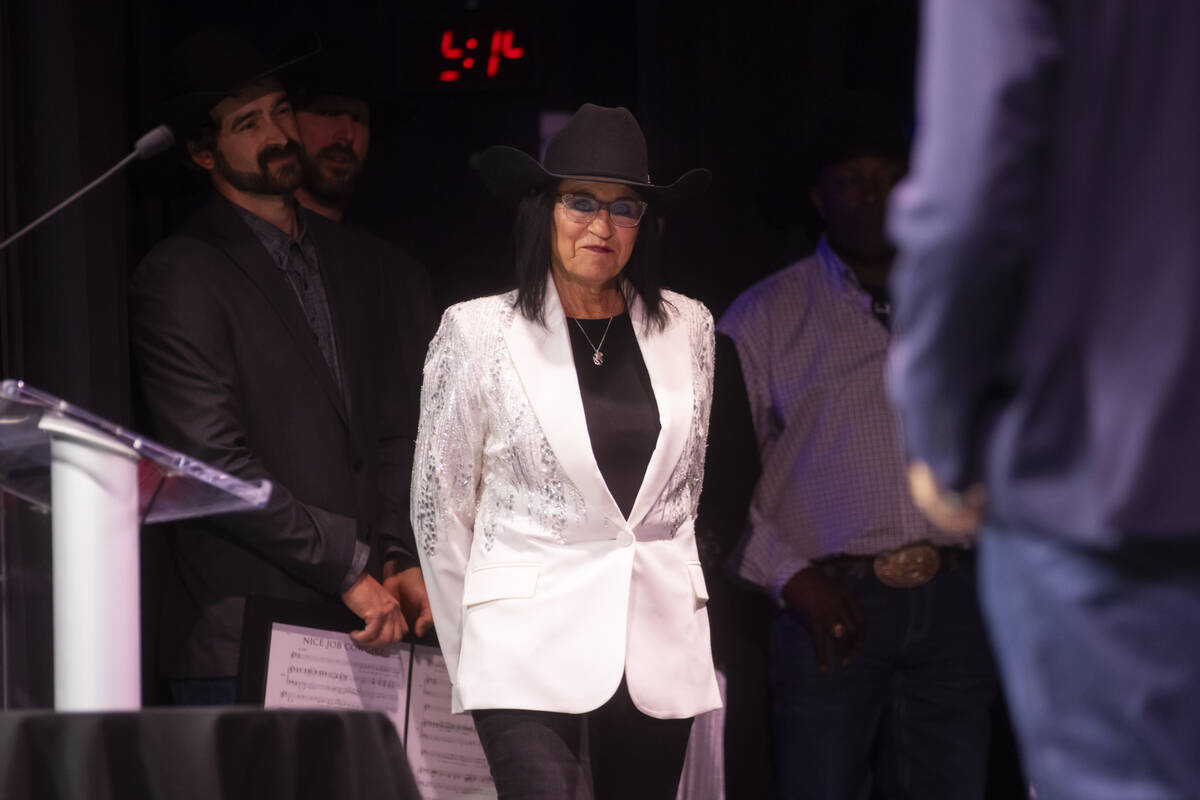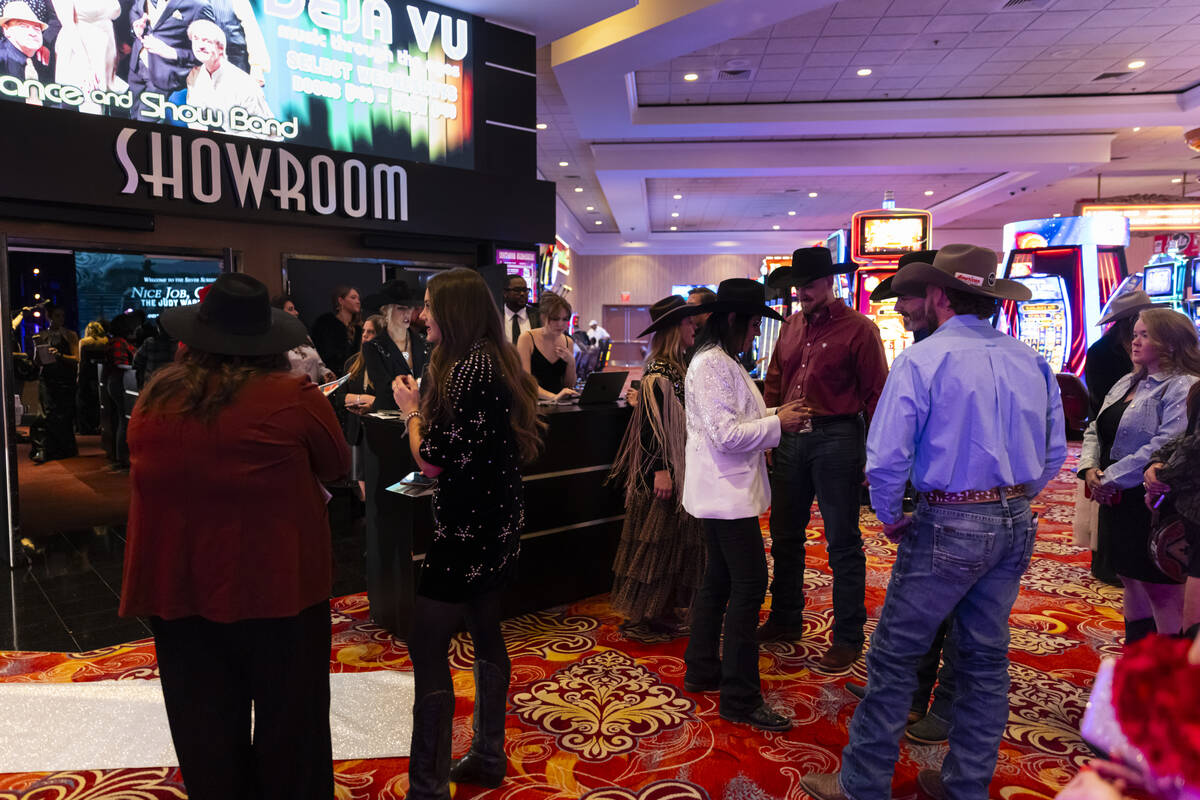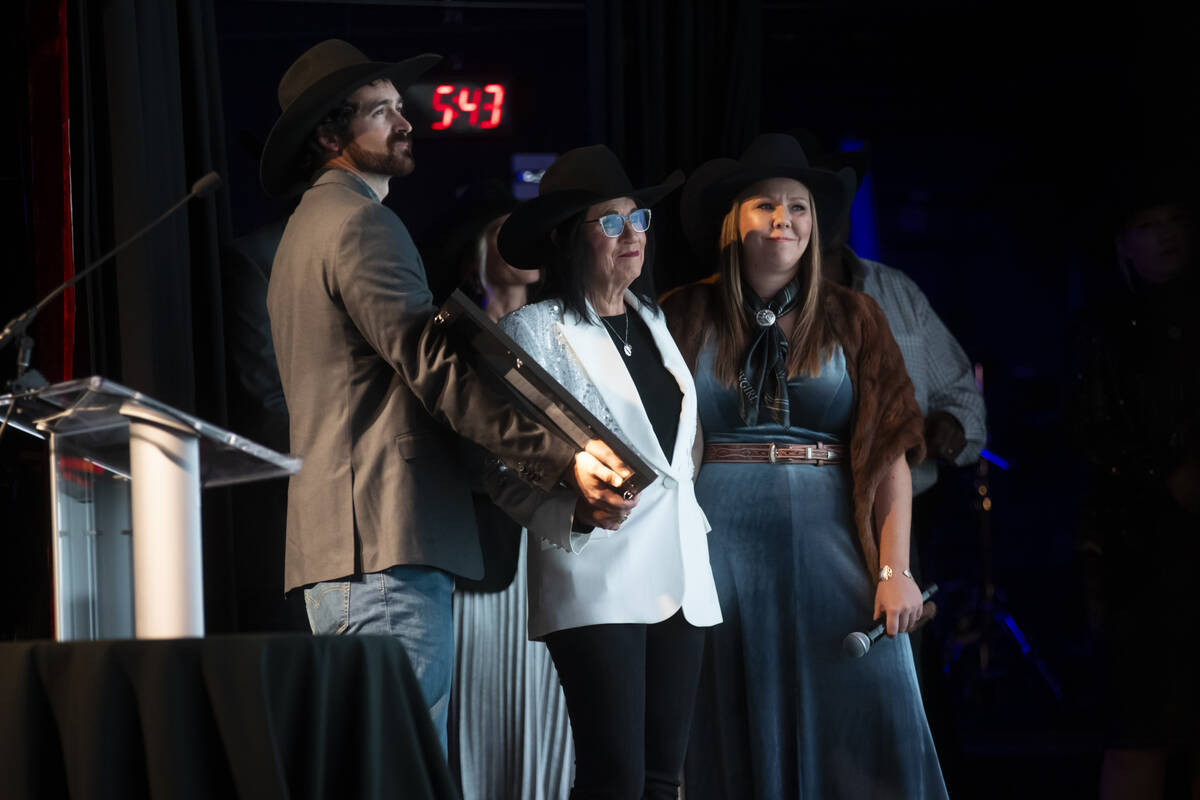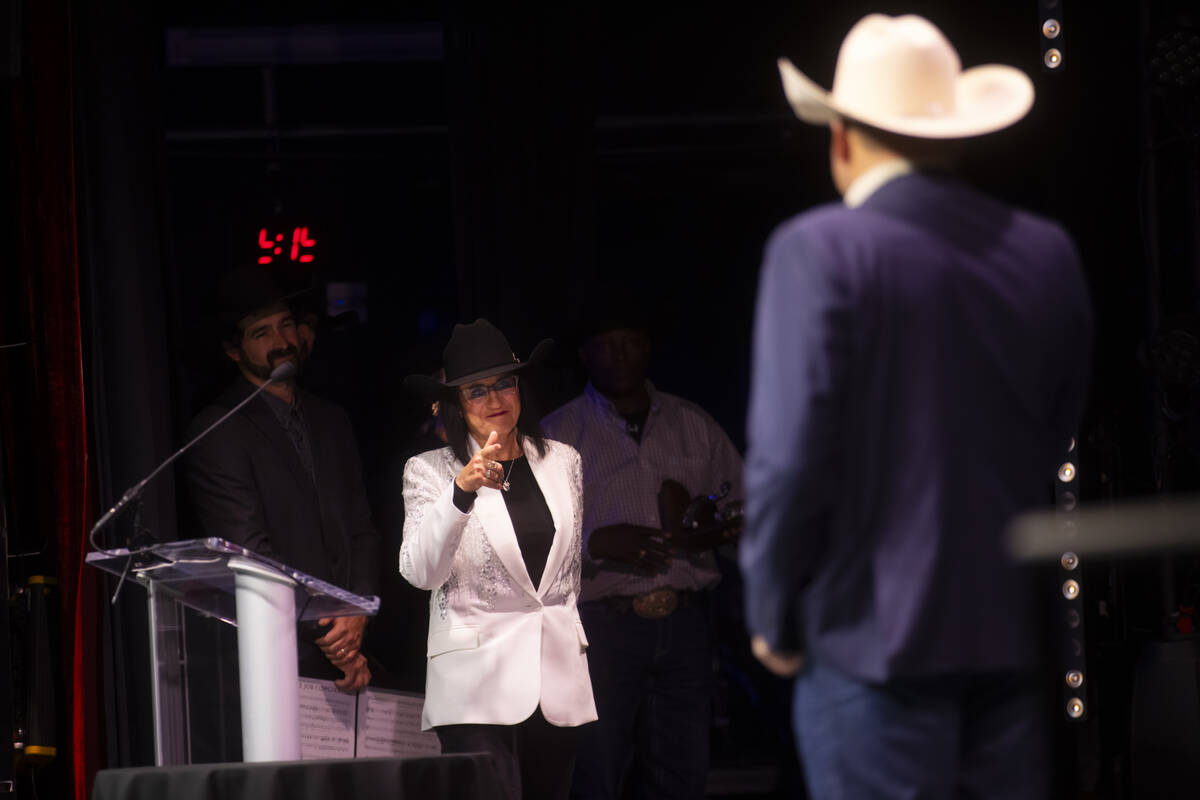Buckle up: Western icon Judy Wagner stars in new documentary
It’s every cowboy’s dream, encased in glass in front of the South Point gift shop.
Judy Wagner eyes a gleaming gold belt buckle the size of a large man’s fist.
Etched into its face: An image of two horse riders roping a steer amid bejeweled, ornamental swirls, a gritty scene preserved in glamour.
“Pro Rodeo Cowboys Assn 2024 World Champion Header” it reads.
The buckle looks laser-cut, such is the attention to detail inherent in each crevice, each minute flourish — look closely enough, and you can see the steer’s ribs. (A magnifying glass helps).
And yet every step in its creation — the pantagraphing, fabricating, soldering, polishing and engraving — is all done by hand over the course of four to six weeks, meaning each buckle is like a set of artisanal fingerprints: no two are alike.
Every year, hundreds of rodeo competitors spend thousands of hours in pursuit of this very thing, a wearable trophy awarded to National Finals Rodeo champions, created by renowned Western jewelry and buckle company Montana Silversmiths.
“With the National Finals Rodeo and the influx of people into Las Vegas at this time, it’s all about the buckle for these cowboys,” Wagner explains, “because they will go throughout the year in hopes of gaining the opportunity of competing here.
“And then that culmination is the gold buckle that states that they are the world champion,” she continues. “It truly is a pinnacle in our sport.”
Wagner would know: As the former chief marketing officer for Montana Silversmiths, she presented the buckles to NFR winners for over two decades before retiring last year, and was instrumental in securing the company’s partnership with NFR, which dates back to 2000.
With NFR back in town, so is Wagner, albeit under a different guise: she’s the subject of a new short documentary “Nice Job, Cowgirl: The Judy Wagner Story,” which premiered at the South Point last week and will debut on the Cowboy Channel in the near future.
The film chronicles Wagner’s lengthy, pioneering career in all-things Western culture, from ranch cowgirl to rodeo competitor to 4-H extension agent to entrepreneur.
In a field traditionally dominated by men, Wagner’s a true trailblazer, having founded her own rope business and helped elevate Montana Silversmiths from a once-small company to a big name in the Western industry that’s become synonymous with NFR.
“When I think of a cowgirl, and if I were to look it up in the dictionary, I feel like there should be a picture of Judy Wagner, because she is all of those things,” says Kiki Shumway, president of the Miss Rodeo America Pageant, in the documentary. “She’s everything about our Western culture and promoting and being a positive mentor to young women.”
Among these many young women: Maegan Taylor, the director of team marketing for the Arizona Ridge Riders at Professional Bull Riders.
“She taught me how to be a cowgirl, ” Taylor says in the film. “Anything that I do, I can be strong, I can be tough, I can work hard. That’s just what cowgirls do.”
Origins of an ethos
She pushes herself away from the table, arms outstretched, and grips an imaginary horse.
Judy Wagner’s in the South Point sportsbook, recalling the origins of a phrase she’s become synonymous with: “Nice job, cowgirl;’ ‘Nice job, cowboy.’”
Years ago, Wagner was volunteering as a sidewalker for a developmentally disabled class in her native Montana.
One day, she was working with a woman who embraced her horse prior to dismounting.
“She put her arms around this horse’s neck,” Wagner recalls, re-enacting the woman’s movements, “and laid her ear into it. Her voice was so angelic, she just said, ‘Nice job, cowboy. Nice job.’ And it went into my heart right then.
“I still get shivers when I hear it — right now, I got it right now,” she continues, shoulders shuddering. “And it was like,
For filmmaker Natalie McFarland, who directed “Nice Job, Cowgirl,” the phrase is an encapsulation of who Wagner is — and a natural title for her documentary, which she began filming at last year’s NFR, interviewing over 30 subjects and compiling hundreds of hours of footage.
“If you get that, ‘nice job cowboy, nice job cowgirl,’ you’re doing something right,” she says, sitting across from Wagner. “So we wanted to take everything that Judy had poured into others, which is recognizing them when they do well, and pour it back into her. Because even though it’s her statement, she is ‘nice job cowgirl,’ you know?”
A natural born cowgirl
The oldest of eight siblings, Wagner grew up on a ranch in Avon, Wyoming, where she was expected to toil just as hard as the boys.
“I worked on the ranch with my brothers,” Wagner recalls. “I roped with them. I didn’t know there was a difference.”
After attending college to become a 4-H extension agent, Wagner and her husband Alvin started a rope company, Gator Ropes, in 1987.
Wagner launched the business in the garage, tying ropes in her basement.
Back then, she was wary of calling attention to the fact the company was helmed by a woman, considering how male-centric the industry was.
“I didn’t feel comfortable at that time letting everybody know that a woman ran it,” Wagner acknowledges. “A lot of times that was kept secret — or not secret, but I didn’t promote it.”
What she did promote was her brand — brilliantly.
Though she had no marketing background, Wagner developed some then-novel innovations to build her business, adding two feet to the head rope, naming the ropes and creating a cartoon Gator mascot especially popular with the kids.
“Even though I knew nothing really about marketing, I’ve just grown into it,” Wagner says. “It was just telling stories and doing things of value and having fun. Those names, the Intimidator, Instigator, and creating these characters brought it to life. So people would just come to our brand.”
And that they did — in droves.
“One of my favorite things was a Gator Rope,” recalls Coleman Proctor, one of the top-ranked professional ropers in the world, in “Nice Job, Cowgirl.” “Each different style of rope was named, and it all came with a little Gator key chain. I mean, I didn’t even have keys, but I wanted that Gator key chain. I’d be so excited every time we’d go get a Gator rope.”
Perhaps most significantly, Gator was also the first rope company to secure an endorsement deal with the Professional Rodeo Cowboys Association (PRCA) and put brand patches on rodeo competitors.
“That gets guys down the road now,” McFarland says of the endorsement money generated from said patches. “The fact that Judy started that is a major industry change. That is revolutionary.”
It would also foreshadow her success with Montana Silversmiths, where she was hired to be the director of marketing in 2000 after she and her husband sold Gator Ropes.
Time to rope a new challenge.
‘Every buckle has a story’
“It’s business card. A cowboy business card.”
Judy Wagner’s talking about belt buckles.
“It’s something you can tell about somebody from a long ways away, where they’re from, what they’re passionate about — everything about them — just by looking at their buckle,” she explains, her voice as bright as her attire is dark, dressed head-to-toe in black.
“If you want to talk to a cowboy, sometimes they want to talk, and sometimes they don’t,” she continues. “Two things they’ll talk about: their horse and their buckle, and then you can get them to tell you everything about it. Each one has a special meaning to them. Belt buckles are really a part of the culture, the Western lifestyle. It’s an iconic representation of who we are. It speaks to something that is deep inside of you, what your purposes are, what your passion is.”
And so Wagner developed a saying, “Every buckle has a story,” which would become a motto for Montana Silversmiths after she joined the company.
Wagner also helped trademark the phrase “Brand of champions” for the business.
“Nike doesn’t even have the ‘brand of champions,’” she notes with pride.
Perhaps most significantly, Wagner worked to secure a sponsorship deal with the Professional Rodeo Cowboys Association and its annual championship, the National Finals Rodeo.
Montana Silvermiths has been creating the much-sought-after buckles for NFR ever since.
It’s been a game changer.
“Her concepts in branding and marketing transformed that little company and took advantage of the PRCA brand and the National Finals Rodeo brand,” says Steve Rempelos, former CMO of the PRCA, in the documentary. “(She) really moved that company in a direction that made it well known as the gold standard, if you will, for all things Western in the buckles and jewelry business.”
About those buckles: they represent much more than a win.
“It’s almost a recognition award in and of itself,” McFarland explains. “It’s not an easy job to cowboy 365 days a year. It’s not like football; it’s not like baseball, where you can sit on the bench and get paid. That’s not true in rodeo.
“If you’re not winning, you’re not pulling checks,” she continues. “If you’re not pulling checks, you’re probably not getting down the road. That buckle’s a recognition of all that time, effort, money and brutality on your own body. Those are the most coveted buckles in the Western industry.”
‘She means this’
The movie’s over, but Judy Wagner’s just begun.
The lights have come up in the South Point Showroom following the premiere of “Nice Job, Cowgirl,” the venue crowded with well-heeled cowboys in sport coats and jeans and women in sparkling get-ups that glimmer like disco balls, nearly everyone donning a cowboy hat.
Wagner takes the stage to address the audience.
“Now for the rest of the story, and why I’m really here,” she says, expressing the ambivalence that she once felt about taking part in the documentary. “Seeing your name on a big screen like this, it’s kind of a big deal. And it kind of bothered me.
“It’s a true honor,” she continues, “But why was I going to be up here? I couldn’t understand why that was happening to me.”
As McFarland notes, Wagner was cool to the project, initially.
“She told me, ‘No,’ at first,” remembers McFarland, who also helms McFarland Productions and Off Your Rocker Films and who’s shot promotional clips for Montana Silversmiths in the past. “She’s like, ‘I don’t want this.’ And I said, ‘Yeah, you do.’”
What ultimately convinced Wagner to participate in the documentary was a revelation she had while praying: “It’s not about you Judy, it’s about the message.”
This message — paying things forward; serving others — lies at the heart of “Nice Job, Cowgirl.”
“Yes, it’s Judy’s story, but it’s based in the Western lifestyle — it’s all those things — but the film is really a story of leadership,” McFarland says. “It’s really a story on mentorship. It’s really a story on looking out for each other.
“It’s general concepts that make you better as a person,” she continues. “It doesn’t matter where you are. You could be a stock broker in New York City or a cowgirl out on a ranch. There’s always a piece of leadership, a piece of mentorship, planting a seed, working with others. It’s only going to enrich your own life at the same time as you’re helping others.”
Wagner’s passion for mentorship is rooted in tragedy: she cites the passing of her father, who died in a tractor accident when she was 16, with putting her on this path.
A few weeks prior to his death, Wagner’s dad told her that he would always be proud of her no matter what she chose to do in life.
“Those seven words, ‘I will always be proud of you,’ planted a seed in me,” she recalls in her speech after the premiere.
And so Wagner’s spent much of her life attempting to plant them in others, especially her female counterparts.
“Every time I have a conversation with her, she talks about helping other women in the industry,” says Ken Amorosano, publisher and CEO of “Cowgirl” magazine, in the film. “She really is not only passionate, but she’s emotional about that. She means this.”
“I learned from her,” recalls Tia Bledsoe, Pendleton Brand Heritage Director for Proximo Spirits, in the documentary, “I really felt, like, ‘This is a powerful woman that has a voice,’ and that kind of made me take a step back and realize that I can be a part of this.”
Even though Wagner officially retired from Montana Silversmiths in 2023, she’s as omnipresent as ever at NFR this year, where everyone seems to know her name and associates joke that a five-minute walk through a casino becomes a half-hour trek with Wagner in tow due to all the people who come up to greet her.
Besides, for Wagner, being a cowgirl has always been less a job than a way of life.
You can’t retire from that.
“This is really a lifetime sport, a lifetime career,” Wagner says. “I love the Western industry. I love the Western lifestyle. And as far as I’m concerned, I’ll probably be an advocate for it for the rest of my life.
“These are my people,” she adds. “This is my world.”
This story has been updated to correct the film title and Steve Rempelos’ surname.
Contact Jason Bracelin at jbracelin@reviewjournal.com or 702-383-0476. Follow @jasonbracelin76 on Instagram.



